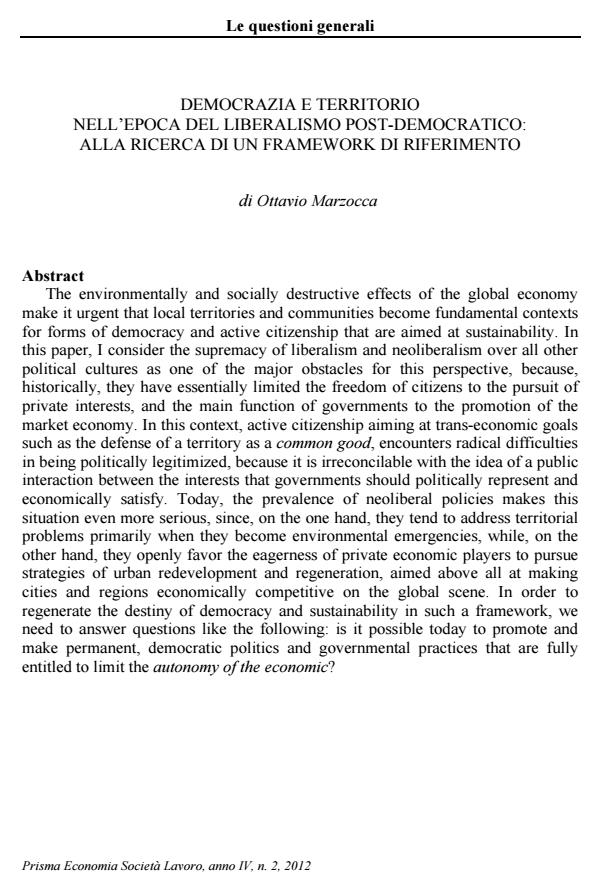Democrazia e territorio nell’epoca del liberalismo post-democratico: alla ricerca di un framework di riferimento
Titolo Rivista PRISMA Economia - Società - Lavoro
Autori/Curatori Ottavio Marzocca
Anno di pubblicazione 2013 Fascicolo 2012/2
Lingua Italiano Numero pagine 14 P. 14-27 Dimensione file 222 KB
DOI 10.3280/PRI2012-002003
Il DOI è il codice a barre della proprietà intellettuale: per saperne di più
clicca qui
Qui sotto puoi vedere in anteprima la prima pagina di questo articolo.
Se questo articolo ti interessa, lo puoi acquistare (e scaricare in formato pdf) seguendo le facili indicazioni per acquistare il download credit. Acquista Download Credits per scaricare questo Articolo in formato PDF

FrancoAngeli è membro della Publishers International Linking Association, Inc (PILA), associazione indipendente e non profit per facilitare (attraverso i servizi tecnologici implementati da CrossRef.org) l’accesso degli studiosi ai contenuti digitali nelle pubblicazioni professionali e scientifiche.
The environmentally and socially destructive effects of the global economy make it urgent that local territories and communities become fundamental contexts for forms of democracy and active citizenship that are aimed at sustainability. In this paper, I consider the supremacy of liberalism and neoliberalism over all other political cultures as one of the major obstacles for this perspective, because, historically, they have essentially limited the freedom of citizens to the pursuit of private interests, and the main function of governments to the promotion of the market economy. In this context, active citizenship aiming at trans-economic goals such as the defense of a territory as a common good, encounters radical difficulties in being politically legitimized, because it is irreconcilable with the idea of a public interaction between the interests that governments should politically represent and economically satisfy. Today, the prevalence of neoliberal policies makes this situation even more serious, since, on the one hand, they tend to address territorial problems primarily when they become environmental emergencies, while, on the other hand, they openly favor the eagerness of private economic players to pursue strategies of urban redevelopment and regeneration, aimed above all at making cities and regions economically competitive on the global scene. In order to regenerate the destiny of democracy and sustainability in such a framework, we need to answer questions like the following: is it possible today to promote and make permanent, democratic politics and governmental practices that are fully entitled to limit the autonomy of the economic?
Ottavio Marzocca, Democrazia e territorio nell’epoca del liberalismo post-democratico: alla ricerca di un framework di riferimento in "PRISMA Economia - Società - Lavoro" 2/2012, pp 14-27, DOI: 10.3280/PRI2012-002003